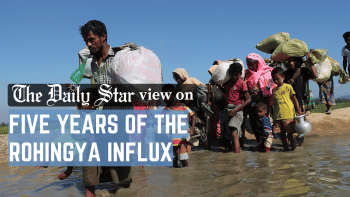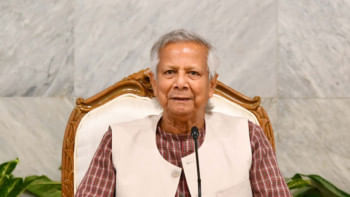Police running riot in Rohingya refugee camps?

When the Armed Police Battalion (APBn) took over the responsibility of security at the Rohingya refugee camps from Cox's Bazar district police more than two years ago, it was with the aim of properly maintaining law and order and ensuring the safety of refugees who were vulnerable to violence from criminal gangs and armed groups. How disappointing to find now – as laid out in a recent report from Human Rights Watch (HRW) – that the forces in charge of security are not only failing to ensure it, but are allegedly complicit in making it worse.
According to the HRW report, members of the APBn are getting involved with extortion, arbitrary arrests, and custodial torture of Rohingya refugees. On top of that, its lack of oversight over the real issues in the camps has led to a sharp deterioration in the security situation. Some refugees even spoke of collusion between APBn officers and criminal/armed gangs operating in the camps.
These are all grave allegations that must be taken seriously. While some of the testimonies regarding torture in custody are horrific, the revelation cannot exactly be called surprising. We have, in this very column, expressed our concerns in the past over the use of torture and harassment as methods of interrogation by police forces, which continues unabated, despite the formulation of the Torture and Custodial Prevention Act in 2013 and despite widespread condemnation of lack of efforts to prevent them.
The situation is the same when it comes to bribery. According to refugees' testimonies in the report, they have been made to pay bribes to avoid arrest, release a detained family member, and even to access relief items like rice and tarpaulins. There are also accusations of false cases filed against refugees for the purpose of extorting money from them. What is truly concerning is that these allegations are being reported in a space where police forces have even more free rein than usual to act with impunity. As one of the most vulnerable communities in the country, the refugees have access to almost no other avenue for justice for any wrong committed against them.
So far, the only response from the APBn has been one of blanket denial. However, there is no denying that security is still a big issue in the refugee camps. Reportedly, criminal gangs involved in drug trade and other crimes continue to operate there. Why has the APBn, in all this time, failed to make a dent in dealing with these security issues? We do not feel this question is unjustified in the present context.
It is now imperative that the government investigates these allegations, and holds responsible police officers to account. The HRW recommendation of training non-APBn personnel in each camp to receive complaints from refugees against police officers should also be taken into consideration. At the same time, donors must step up and do their part in providing funds and supporting projects that promote the safety of refugees in camps. If urgent steps are not taken, the situation in the camps will only continue to worsen.

 For all latest news, follow The Daily Star's Google News channel.
For all latest news, follow The Daily Star's Google News channel. 







Comments